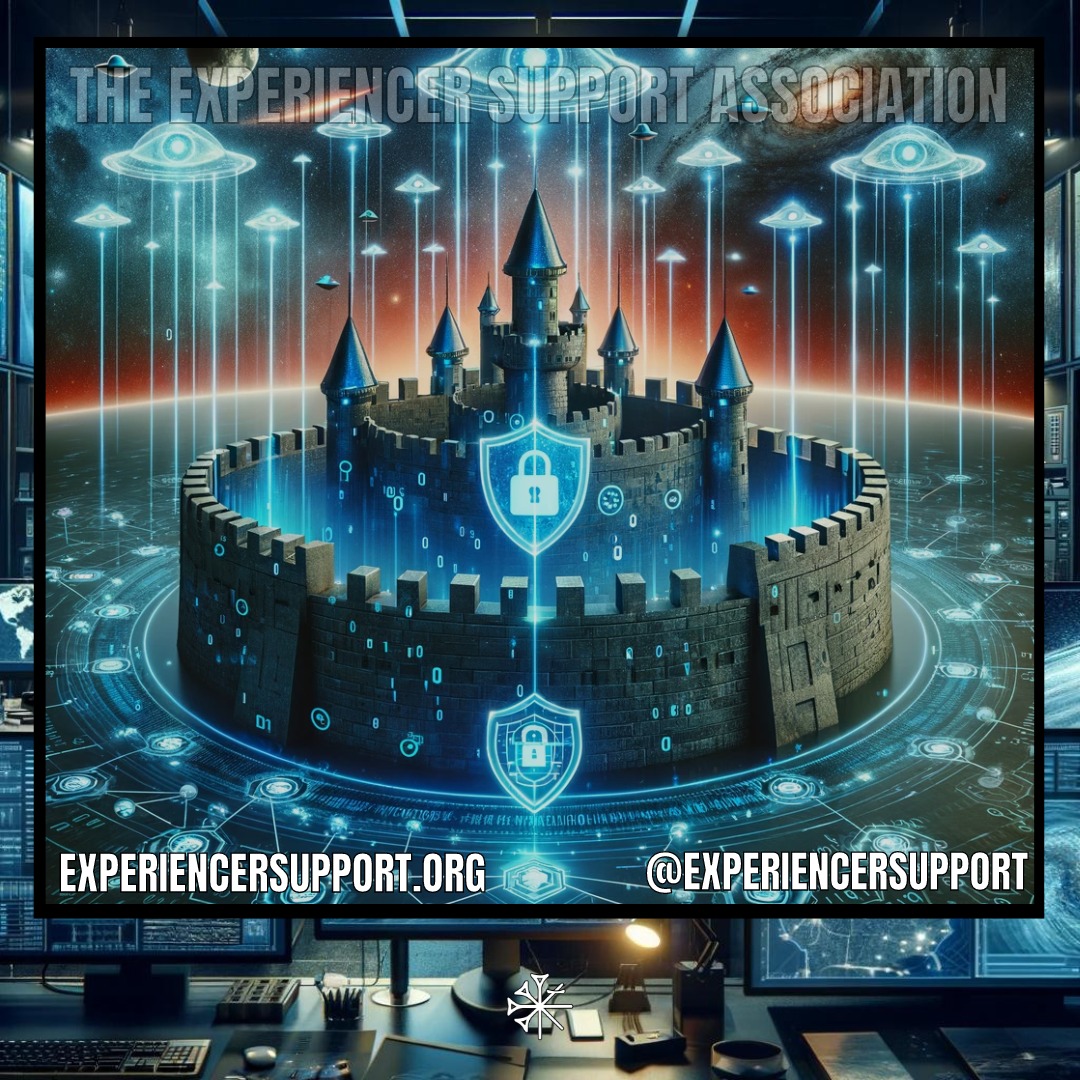MUFON Under Siege Part 1: MUFON Has Been Hacked
- Post Date:
- Release Date: February 8, 2024

In the shadow of February 7, 2024, the Mutual UFO Network (MUFON), an institution at the forefront of UFO investigation, encountered a cyber onslaught that shook its foundations. The attack targeted its Case Management System (CMS), a vital artery for the organization’s operations and a repository of sensitive data chronicling countless UFO phenomena. This breach was a clarion call, signifying a pivotal moment for MUFON’s operational security and standing within the Ufology community. Coupled with the unsettling revelations from Phil Leech, a seasoned member of MUFON’s leadership, this incident underscores the urgent need for a comprehensive evaluation of the event’s ramifications and formulating a strategic path forward.
About the Breech
MUFON grappled with an unforeseen cyberattack from an Eastern US IP address, marking a significant breach of its CMS. This digital infiltration allowed attackers to gain unauthorized access to a wealth of sensitive information, causing an operational standstill and raising alarms about data integrity. Dave Scott of Spaced Out Radio was among the first to shed light on this breach, emphasizing the profound impact on MUFON’s trustworthiness and operational continuity. In the aftermath, Bob Spearing‘s disclosures painted a picture of an organization caught off-guard, striving to comprehend the breach’s extent and implications. This critical juncture has sparked essential dialogues on reinforcing MUFON’s cybersecurity framework and crisis management protocols, aiming to safeguard the anonymity and trust of the experiencers.


Within the intricate layers of MUFON’s operations, Phil Leech’s revelations have highlighted practices that raise significant ethical questions, challenging the core values that the organization purports to uphold. Among these practices, the conduct of invasive background checks on individuals who come forward with UFO sightings stands out as particularly contentious. Such actions, which delve into the personal lives of experiencers without explicit consent, not only breach the trust vested in MUFON by those it serves but also skirt dangerously close to violating legal standards set forth by HIPAA (Health Insurance Portability and Accountability Act) regulations. These regulations are designed to protect individuals’ privacy and health information, making their potential breaches a severe concern.
Leech’s account suggests that the information gleaned from these background checks has been used to influence the handling of UFO sighting reports, with some reports needing to be more timely and considered based on the personal history of the reporters. This approach compromises the privacy and dignity of individuals seeking to share their experiences and undermines the scientific objectivity essential to MUFON’s mission. The implications of such practices are twofold: they risk legal repercussions for MUFON and, perhaps more critically, erode the foundational trust and openness crucial for the continued contribution of valuable sighting reports by the public.
Furthermore, Leech’s insights into MUFON’s financial and operational priorities paint a picture of an organization at a crossroads, seemingly torn between its stated mission of scientific inquiry and a drift toward financial opportunism. This includes strategies and decisions prioritizing revenue generation over the nonprofit’s core objective of advancing the understanding of UFO phenomena. Examples highlighted by Leech include questionable financial maneuvers, such as leveraging the organization’s case database for commercial purposes without adequate transparency or benefit to MUFON itself or its contributors.
These revelations necessitate a thorough and critical reassessment of how MUFON aligns its fiscal strategies and operational decisions with its nonprofit status and ethical commitments. Pursuing financial stability is, undoubtedly, a practical concern for any organization. However, when such pursuits threaten to compromise ethical standards or the integrity of scientific inquiry, a recalibration is imperative. MUFON is presented with an opportunity to reexamine its priorities, ensuring that its financial strategies and operational practices not only comply with legal and ethical standards but also reflect its dedication to contributing meaningfully to the field of Ufology.
To navigate this complex terrain, MUFON must take decisive steps to fortify its privacy policies, ensuring they are robust enough to protect the personal information of those who report UFO sightings. This includes establishing clear protocols for handling sensitive information, training staff and volunteers on privacy best practices, and ensuring that all operational activities are conducted with the utmost respect for individual privacy rights. Moreover, MUFON must engage in an open dialogue with its members and the broader Ufology community to rebuild trust, affirming its commitment to ethical practices, scientific integrity, and the transparent pursuit of knowledge.
In doing so, MUFON can reaffirm its position as a leading organization in studying UFO phenomena, grounded in the principles of scientific rigour, ethical responsibility, and respect for the experiences and contributions of individuals worldwide. This path forward is essential for MUFON’s credibility and effectiveness and for the continued growth and vitality of Ufology as a field of inquiry. An immediate and thorough overhaul of MUFON’s cybersecurity measures is imperative.
Pathways to Reform and Renewal
Adopting state-of-the-art cybersecurity protocols is vital in preempting future intrusions and reinstating confidence in MUFON’s capability to protect sensitive information. MUFON is at a crossroads, necessitating a renewed commitment to its scientific objectives and a transparent modus operandi in evidence handling and investigation processes. This commitment is crucial for restoring faith in MUFON’s scientific credibility and ethical integrity.
Addressing the centralized control and fostering a culture of inclusivity and openness is paramount. MUFON must undertake significant structural reforms to democratize its decision-making processes, ensuring that diverse perspectives are considered and valued.MUFON’s path to rejuvenation involves engaging proactively with the broader Ufology community. Through forums, discussions, and collaborative initiatives, MUFON can facilitate a collective journey toward understanding, healing, and shared discovery. The cyberattack on MUFON’s CMS, coupled with the introspective revelations from Phil Leech, heralds a watershed moment for the organization. By confronting these challenges with integrity, commitment, and actionable strategies, MUFON can transcend its current tribulations.
What Happens Now?
While fraught with challenges, this moment also presents an unparalleled opportunity for healing, growth, and renewed collaboration among all stakeholders: MUFON as an organization, Phil Leech as a whistleblower with deep insights into its workings, and the experiencers who are the very heart of MUFON’s mission.
For MUFON, the path forward involves addressing the immediate vulnerabilities exposed by the cyberattack and embracing a period of introspection and transformation. By implementing rigorous cybersecurity measures and reaffirming its commitment to scientific integrity and transparency, MUFON can rebuild trust with the community. Moreover, adopting a more inclusive and democratic approach to decision-making will ensure that a diversity of perspectives and expertise shapes its future. MUFON’s willingness to evolve and adapt to these challenges will reinforce its position as a leading organization studying UFO phenomena.
Phil Leech’s courageous decision to highlight areas of concern within MUFON underscores the importance of accountability and ethical conduct within the organization. By fostering an environment where constructive criticism is welcomed and acted upon, MUFON can benefit from the insights of its members and experts, turning potential points of contention into opportunities for improvement and innovation. Recognizing the value of Leech’s revelations, MUFON can engage in open dialogues that bridge gaps and fortify its mission with enhanced ethical standards and practices.
For experiencers—the courageous individuals who share their encounters with the unknown.
Experiencers are encouraged to share their stories with those they trust, emphasizing the importance of a diverse perspective in assessing their experiences. By reporting to multiple trusted sources, experiencers can ensure a more balanced and comprehensive understanding of their encounters. TESA supports this approach, advocating for the value of each contribution in the broader quest to unravel the mysteries of the UFO phenomenon.
TESA’s operational and ethical standards are designed to reassure current and future experiencers that their stories are heard and held with the utmost confidentiality and respect. This approach underscores the significance of each experiencer’s role in contributing to our collective knowledge and understanding of the unexplained, reinforcing that their privacy is paramount and their contributions invaluable.
The journey ahead for MUFON, Phil Leech, and the community of experiencers is one of collaborative healing and mutual growth. All parties can contribute to a more robust, transparent, and inclusive exploration of the unknown by embracing the lessons learned from this critical juncture. This period of reflection and renewal will undoubtedly strengthen the collective endeavour to study UFO phenomena, grounded in respect, scientific rigour, and an unwavering commitment to truth.
In Conclusion
The unfolded events present a unique chance for MUFON, Leech, and experiencers to forge a balanced, whole, and revitalized path forward. United by a shared passion for discovery and a commitment to integrity, the Ufology community can emerge from this moment more unified and effective than ever before, poised to unlock new understandings and embrace the mysteries of the cosmos with open minds and hearts.

Ryan Stacey
Heed The World


